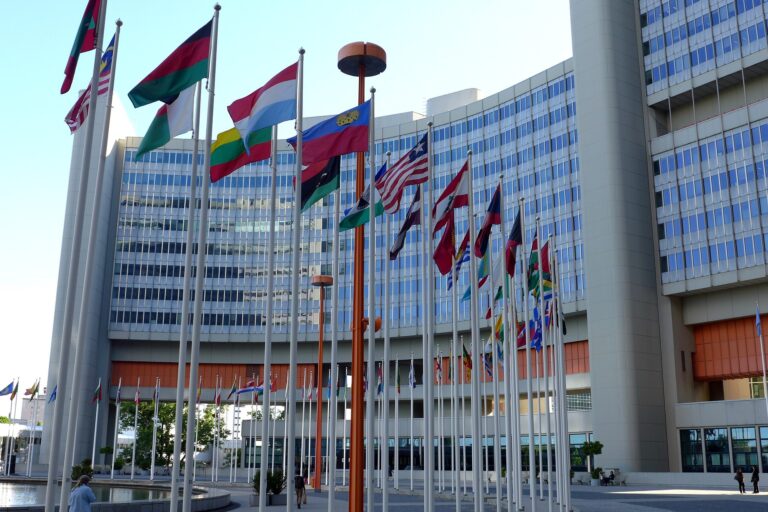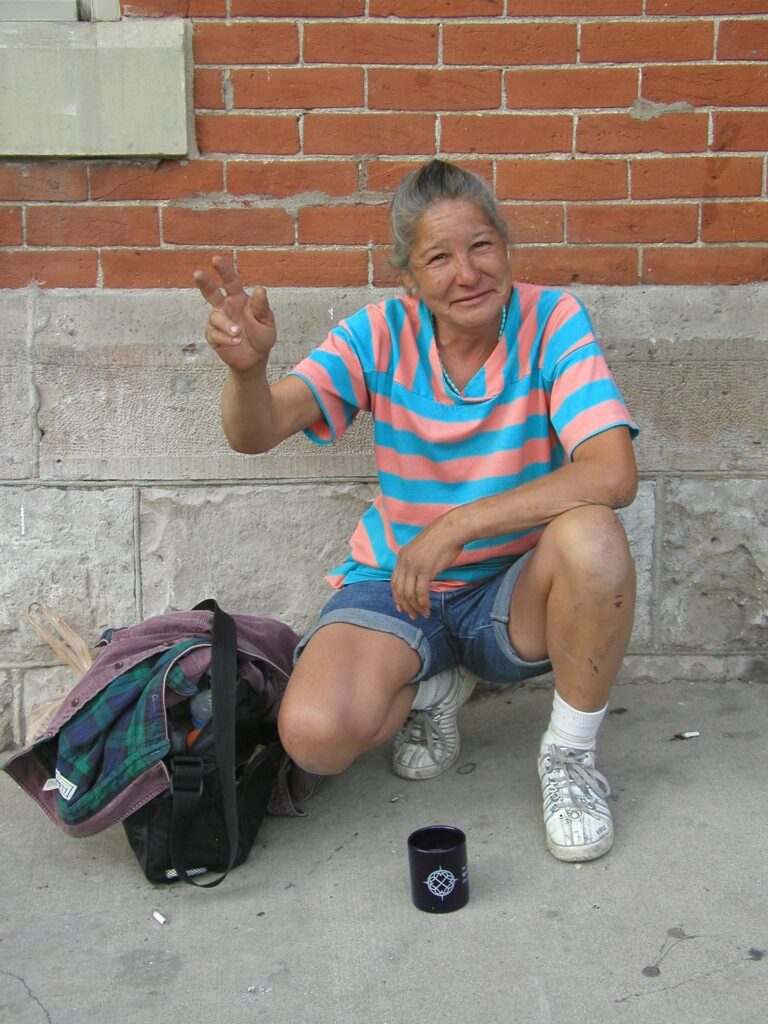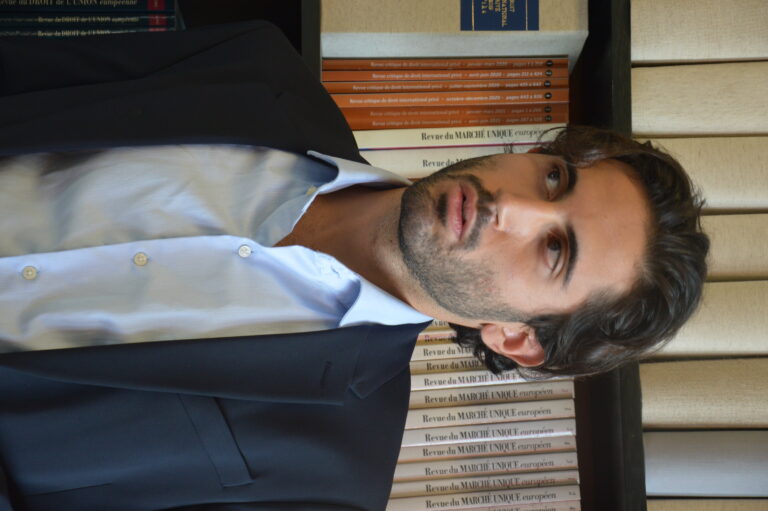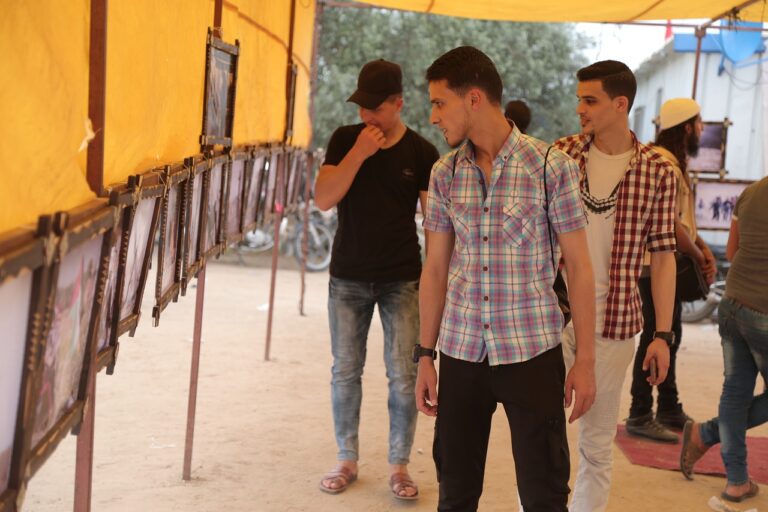By Robin Makaron
Recent events in Gaza have intensified global discussions and diplomatic disagreements regarding the Israel-Hamas conflict. Notably, French and American diplomats have voiced significant concerns about their respective leaders’ stances on the issue.
A few weeks ago, Le Figaro reported on a joint memorandum composed by a group of French diplomats. This document lamented what they perceived as a pro-Israeli bias in President Emmanuel Macron’s policies.
Likewise, the United States is witnessing internal dissent within its ranks. Over four hundred civil servants penned an open letter to President Joe Biden, contesting his administration’s support for Israel amidst the conflict.
As the region grapples with devastating violence, journalists’ portrayal of stark realities brings this conflict into sharp focus for the global community, exerting a direct impact on public opinion. The widening divergence of opinion within political circles regarding the management of the Israel-Hamas conflict places the role of diplomats on center stage.
The notion of representing sovereigns and governments and implementing a cohesive foreign policy has historically posed practical, political, and conceptual challenges. These fault lines become especially evident during times of conflict.
While the concepts of peace and prosperity hold universal appeal, one might question the foundation upon which diplomats are granted the authority to represent and advocate for them. And if faced with directives that contradict their principles, should diplomatic officials deviate from their assigned course of action
The duty of reserve and discretion, coupled with the demand for unwavering loyalty, raises pertinent questions. It appears that there’s a widespread misunderstanding among the general public regarding the diplomat’s role, particularly in the execution of their country’s foreign policy.
The Role of Contemporary Diplomats in Times of Conflict
Conflict precedes the age-old practice of diplomacy. Through the artistry of diplomacy and the systematic approach of science, diplomats play an essential role in both preventing and managing conflicts and their aftermaths.[1]
An effective diplomatic strategy should be characterized by discretion while incorporating a wide range of measures. This demands outstanding qualities of prudence, judgment, and caution.[2] This is why diplomats should leverage their craft and skills to comprehend situations and act accordingly. This pragmatic approach holds immense importance during times of conflict.[3]
The Madrid Conference stands as a testament to the effectiveness of discreet diplomacy. It marked a historic breakthrough in Arab–Israeli relations, becoming a link between the end of the Gulf War and the signing of the 1993 Oslo Accord.[4]
Mark Laity, a NATO official reflecting on the 2001 Macedonian insurgency, suggests that modern conflict prevention requires a broader spectrum. He argues that preventing conflict demands not just unwavering loyalty, but a nuanced approach built on trust, early intervention, and unconventional thinking.[5]
When diplomacy falters in preventing or resolving conflicts, the diplomat’s role transforms. Like any other profession, it requires a set of skills and traits that are developed through practice and experience.[6]
Before the 2003 U.S.-led invasion of Iraq, American diplomats were tasked with collaborating with military commanders to secure access to facilities for U.S. troops. They also engaged in public and military diplomacy initiatives to garner widespread support for the campaign in Iraq.[7]
This fluctuating role of diplomats is not always crowned with applause, Ivo Andrić, Yugoslav diplomat winner of the Nobel Prize puts it best by stating that the profession ‘both attracts and deceives people’. It is perceived with a mixture of envy and distrust, with its failures and hypocrisy often criticized.[8]
Ethical Crossroads: Navigating Between State Interests and Broader Ideals
Diplomacy stands as a crucial tool for any state, positioned as the sole institution dedicated to systematically managing external affairs on a professional career basis. This is because of ‘the area of operation’ (abroad), and its ‘sensitivity’ (the issue of confidentiality).[9]
The success of diplomacy hinges upon not only the fundamental duties outlined in Article 3 of the Vienna Convention on Diplomatic Relations (1961), which underscores diplomats’ responsibility to represent and advance the interests of their home country, but also on their individual attributes, breadth of education, historical acumen, and grasp of international law.[10]
Recent developments appear to have led diplomats away from the sovereign state, their ‘source of authority’ and raison d’être. This shift may stem from a contemporary perspective valuing diplomats for the skills they possess, rather than whom they represent.[11]
This poses a significant issue as the whole basis of the diplomatic system derives its authority from the claim that representatives embody sovereign states. In medieval times, the ambassador faithfully represented his sovereign to avert any potential ire or displeasure from the ruling monarch.[12]
Bernard Du Rosier, a French prelate and jurist of the fifteenth century, emphasized that the primary objective of a diplomat was, above all, to establish peace. This raises a ‘grand ethical problem’ in case of conflict between ‘the ambassador’s duty to his prince’ and ‘his duty to maintain peace’.[13]
Diplomats who encounter this timeless dilemma don’t always adhere to the idea that their sole responsibility is to advance and promote the particular interests of their states as dictated by current political leaders. They often perceive themselves as working for a broader, nobler cause.[14]
While expected to interpret their roles patriotically due to close contact with their home countries’ administration, diplomats might also develop bonds with host countries, risking a phenomenon known as ‘localitis’.[15]
This risk of ‘going native’ and adopting local views instead of promoting their countries’ interests, poses a significant threat to the integrity of the diplomatic profession.[16]
But as international affairs are moving towards a more collectively organized society of states, the profession evolves, and so too does the individual. Talleyrand is the most famous example of a servant of the state who recognized that Napoleons come and go but that the interests of his beloved nation are eternal.
Diplomatic Dispatches: Disobedience, Loyalty, and Reporting Protocol
Diplomats stationed overseas fulfill various roles: gathering information, drafting reports, and engaging in treaty negotiations.[17]
A good diplomat shies away from clear predictive and biased judgments and strives for accuracy and objectivity. For that purpose, diplomats gather information through different methods and sources which can also include informal discussions with locals and diplomats from other countries.[18]
The difference between the reports of a diplomat and those of a foreign correspondent (of a newspaper, news agency) is that the former only reports what may affect the actions and interests of his government while the correspondent will report whatever seems likely to entertain or inform the general public.[19]
Scholars have noted a potential decline in diplomatic analysis, attributing it to international media and policy development organizations producing analyses, inhibiting diplomats from conveying distinctive insights due to the high risk of leaks.[20]
Nevertheless, diplomatic reporting remains central to today’s embassies, as Iver Neumann puts it, ‘the present-day field diplomat is first and foremost an information gatherer who writes dispatches back to the foreign ministry’. These diplomatic cables constitute privileged communication between government representatives, intended to safeguard sensitive or classified information.[21]
On the other hand, public letters and addresses are often transparent and meant for public consumption, aiming to influence public opinion or engage in public diplomacy.
Differing receptions between French and American officials towards dissenting diplomats can be traced back to the chosen communication methods employed by the dissenting diplomats. The public letter by American civil servants starkly contrasts with the diplomatic cable sent collectively by French diplomats in the Middle East.
Denis Bauchard, a former French ambassador, found the French note’s collective form unusual and implied that the note’s leaking was not accidental.
In today’s contemporary landscape, there’s a prevailing belief that achieving desired outcomes justifies any means employed. This rationale, if applied to diplomacy, may lead to precarious political and governance paths.
The Quai d’Orsay’s response to dissenting diplomats emphasizes that diplomacy surpasses individual opinions aired publicly. Their firm stance serves as a reminder that ambitious international opinions lacking consensus should be tempered. The obligation of reserve and loyalty applies to diplomats and civil servants alike.
Challenges in France’s Middle Eastern Diplomacy
The Middle East and North Africa region holds a special but delicate place not only in France’s foreign policy, but also in its society, politics, history, and culture.
France’s policy in the region goes back several hundred years but its modern features took shape during the Suez crisis and the Algerian War, with Charles De Gaulle’s plan to restore France’s role and influence with the newly independent countries with what subsequently became known as the ‘Arab policy’.[22]
In the Levant, France traditionally positions itself as willing and able to act autonomously if needed as shown by the consistent French nuances in the Middle East and France’s support for Lebanon’s stability amid the ongoing political economic crisis.
Since the Arab uprisings, France’s aggressive stance on Syria may have stood out as stepping away from this balancing act. More recently, issuing an arrest warrant against Syria’s President Bashar Al-Assad over alleged war crimes in 2013 exemplified this stance.
And the Israeli-Palestinian conflict, once central to France’s foreign policy, is now perceived as losing its pivotal place. There’s a consensus among the French diplomatic corps expressing worries over France’s waning influence in countries where it traditionally enjoyed robust relations. Some fear that France’s long-held image of seeking a balanced approach in addressing the Israel-Palestine conflict has faded.
Faced with increasing limitations on regional cooperation within the EU, France’s leadership capacity has been weakened by several changes. This has led to an oscillation between reaffirming its national interests and fostering a cohesive European approach.[23]
France’s foreign policy towards the Middle East conflict has also increasingly aligned with the United States. This orientation has bred a growing perception in Arab countries that France is obediently close to the United States’ stance and provides almost unconditional support to Israel.
This shift in perception also amplifies concerns about France’s stance, raising questions about its impartiality and influence in the region.
Notes:
[1] I. ZARTMAN, WILLIAM. “Preventive Negotiation: Avoiding Conflict Escalation.” (Lanham, MD: Rowman & Littlefield, 2001), 3.
[2] GROSSMAN, MARC. “Diplomacy Before and After Conflict.” PRISM 1, no. 4 (2010): 3–14.
[3] JAZBEC, MILAN. “The Sociology of Diplomacy: A General Outline with Some Aspects and Dilemmas.” Perspectives 21, no. 1 (2013): 87–108.
[4] SPYRIDAKIS, EMMANUEL. “The Role of Diplomacy in Handling International Crises in the Post-Bipolar Era. The Case of the Balkans” ETH Zürich
[5] MARK LAITY, Preventing War in Macedonia, Whitehall Paper Number 68 (London: Royal United Services Institute, January 2008).
[6] J. R. WOOD AND J. SERRES, Diplomatic Ceremonial and Protocol: Principles, Procedures and Practices (New York: Columbia University Press 1970), 4-9.
[7] GROSSMAN, MARC. “Diplomacy Before and After Conflict.” PRISM 1, no. 4 (2010): 3–14.
[8] Who are diplomats? – Diplo Resource. (n.d.). Diplo. Ivo Andric 2002
[9] JAZBEC, MILAN. “The Sociology of Diplomacy: A General Outline with Some Aspects and Dilemmas.” Perspectives 21, no. 1 (2013): 87–108.
[10] KENNAN, GEORGE F. “Diplomacy without Diplomats?” Foreign Affairs 76, no. 5 (1997): 198–212.
[11] SHARP, PAUL. “Who Needs Diplomats? The Problems of Diplomatic Representation.” International Journal 52, no. 4 (1997)
[12] MICHEL FOUCAULT, The Order of Things (New York: Vintage Books 1994), 18.
[13] Cited in Mattingly, Renaissance Diplomacy, 269
[14] SHARP, PAUL. “Who Needs Diplomats? The Problems of Diplomatic Representation.” International Journal 52, no. 4 (1997)
[15] CHELOTTI, NICOLA. “A ‘Diplomatic Republic of Europe’? Explaining Role Conceptions in EU Foreign Policy.” Cooperation and Conflict 50, no. 2 (2015): 190–210.
[16] MALONE D (2012) The evolving nature and role of the diplomatic mission Canadian Foreign Policy Journal 18(2): 225-241
[17] BRIAN HOCKING, ‘Beyond “newness” and “decline”: the development of catalytic diplomacy, Diplomatic Studies Programme Discussion Paper (DSPDP) 10, Diplomatic Studies Programme, Leicester University, 1995
[18] RANA K (2002) Bilateral Diplomacy. New Delhi: Manas Publications
[19] CHAS. W. FREEMAN, JR “The Diplomat’s Dictionnary” Revised Edition United States Institute of Peace Press Washington, DC
[20] DAVIS CROSS, MAI’A. (2012). The Craft of Political Analysis for Diplomats by Raymond Smith. Dulles. Political Science Quarterly. 127. 10.1002/j.1538-165X.2012.tb01153.x.
[21] CORNUT, JÉRÉMIE. “To Be a Diplomat Abroad: Diplomatic Practice at Embassies.” Cooperation and Conflict 50, no. 3 (2015): 385–401.
[22] MANUEL LAFONT RAPNOUIL. Alone in the desert? How France can lead Europe in the Middle east; April 2018. Policy Brief European Council of Foreign Relations
[23] PATRICK MÜLLER (2013) The Europeanization of France’s foreign policy towards the Middle East conflict – from leadership to EU-accommodation, European Security, 22:1, 113-128, DOI

















